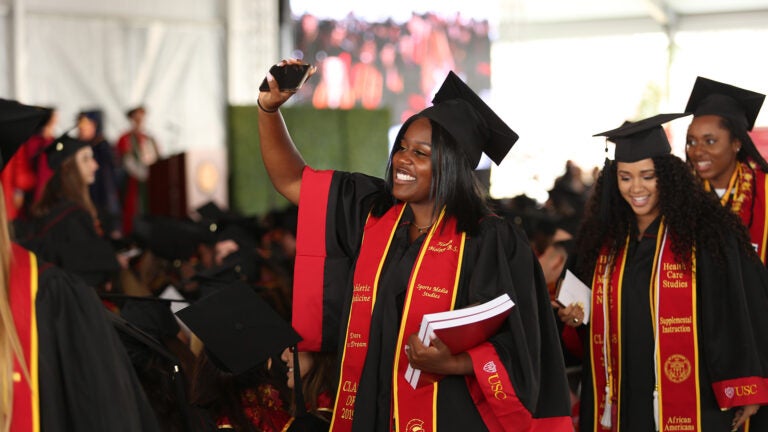Mission
The USC Black Studies Initiative fosters, promotes, and disseminates Black studies research, scholarship, teaching, and community engagement. The BSI team aims to:
- Provide a home for scholarly research and dialogue that centers the historical, political, cultural, artistic, and intellectual experiences of the African Diaspora
- Support connections and collaborations among students and faculty, and among scholars and communities within and beyond USC
- Advance global, transnational, and local understandings of Blackness with attention to Africa, the United States, Europe, the Caribbean, and Latin America

Center Staff
Oneka LaBennett is an anthropologist and a leading scholar of Black girlhood studies, the African Diaspora in the U.S., Caribbean migration and Afro-Asian intimacies, popular culture and hip hop studies, Black feminism, and gender and environmental catastrophe in the Caribbean. LaBennett is the author of Global Guyana: Shaping Race, Gender, and Environment in the Caribbean and Beyond (NYU Press 2024), She’s Mad Real: Popular Culture and West Indian Girls in Brooklyn (NYU Press 2011), and co-editor of Racial Formation in the Twenty-First Century (UC Press 2012).
Professor LaBennett’s most recent book, Global Guyana, develops a powerful set of heuristics to trace the entwined histories of descendants of enslaved Africans and Indian indentured laborers, alongside the contemporary dynamics of the outsized Guyanese diaspora, and the broad reach of the nation’s extractive industries. Previously ranked among the hemisphere’s poorest countries, Guyana is becoming the world’s highest per capita oil producer—offering a critical vantage point for parsing the environmental consequences of the resource extraction that fuels our modern world, as well as pernicious forms of erasure that structure Caribbean women’s lives. The book explores distinct yet interrelated realms, including media depictions, women’s kinship ties, sonic routes, and the circulation of oil and sand, to uncover how this understudied place reshapes transnational gendered racializations and the very topography that has come to be emblematic of the Caribbean region—beaches and shorelines.
LaBennett’s OpEds and public commentary on figures such as Vice President Kamala Harris, Beyoncé and Jay-Z, Rihanna, and Nicki Minaj have appeared in platforms such as Ms. Magazine, Newsweek, The Guardian, Politico, and NBCNews.com. Elle Magazine ranked her course, “Women in Hip Hop,” among the top ten in a list of “College Classes that Give Us Hope for the Next Generation.”
Maya McKeever, Graduate Research Assistant
Maya McKeever studies contemporary homelessness in California. Her work explores media depictions, anti-homeless policies, displacement methods, and oral history interviews to examine how carcerality, colonial history, and race contribute to the U.S. policies and social rhetoric that devalue unhoused individuals. She is motivated by her experiences working with unhoused populations throughout Los Angeles County and is currently a Ph.D. student in USC’s American Studies and Ethnicity Department. As the Graduate Research Assistant for the BSI since Spring 2024, she has helped organize an introductory Open House, jumpstarted the Initiative’s community network on campus, and plans to continue building a strong foundation for the Black studies community at USC.

Learn More 🌐
Mailing List
Sign up for CLLAS’ mailing list
Receive invitations, fellowship announcements, job openings, etc.

Contact Details
Location
University of Southern California
3501 Trousdale Pkwy
Mark Taper Hall (THH) 309
Los Angeles, CA 90089
Center Director
Oneka LaBennett, Professor of American Studies and Ethnicity and Gender and Sexuality Studies
E-mail: oneka.labennett@usc.edu
Graduate Research Assistant
Maya McKeever, Graduate Student in American Studies and Ethnicity
Email: bsi@dornsife.usc.edu

